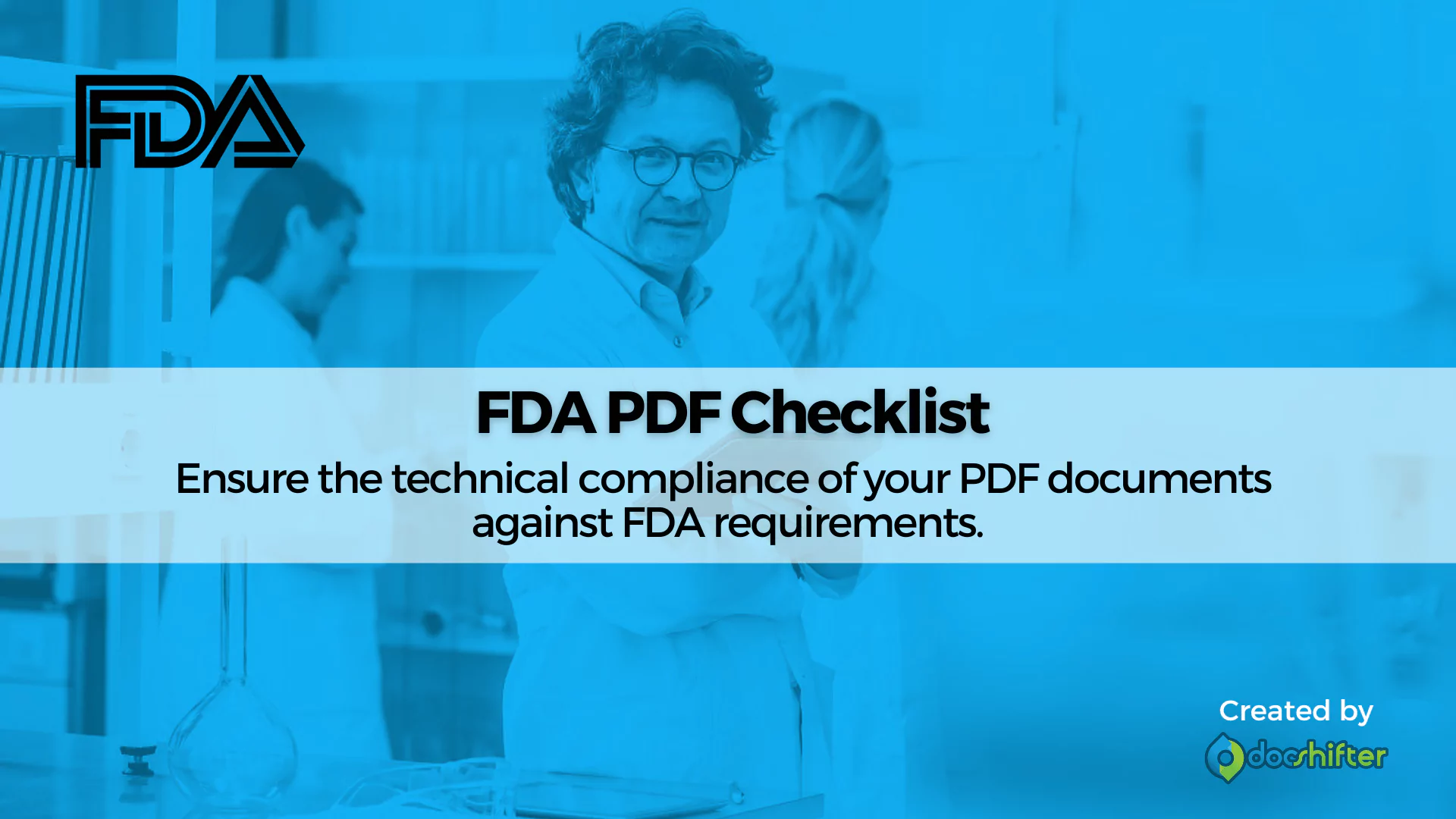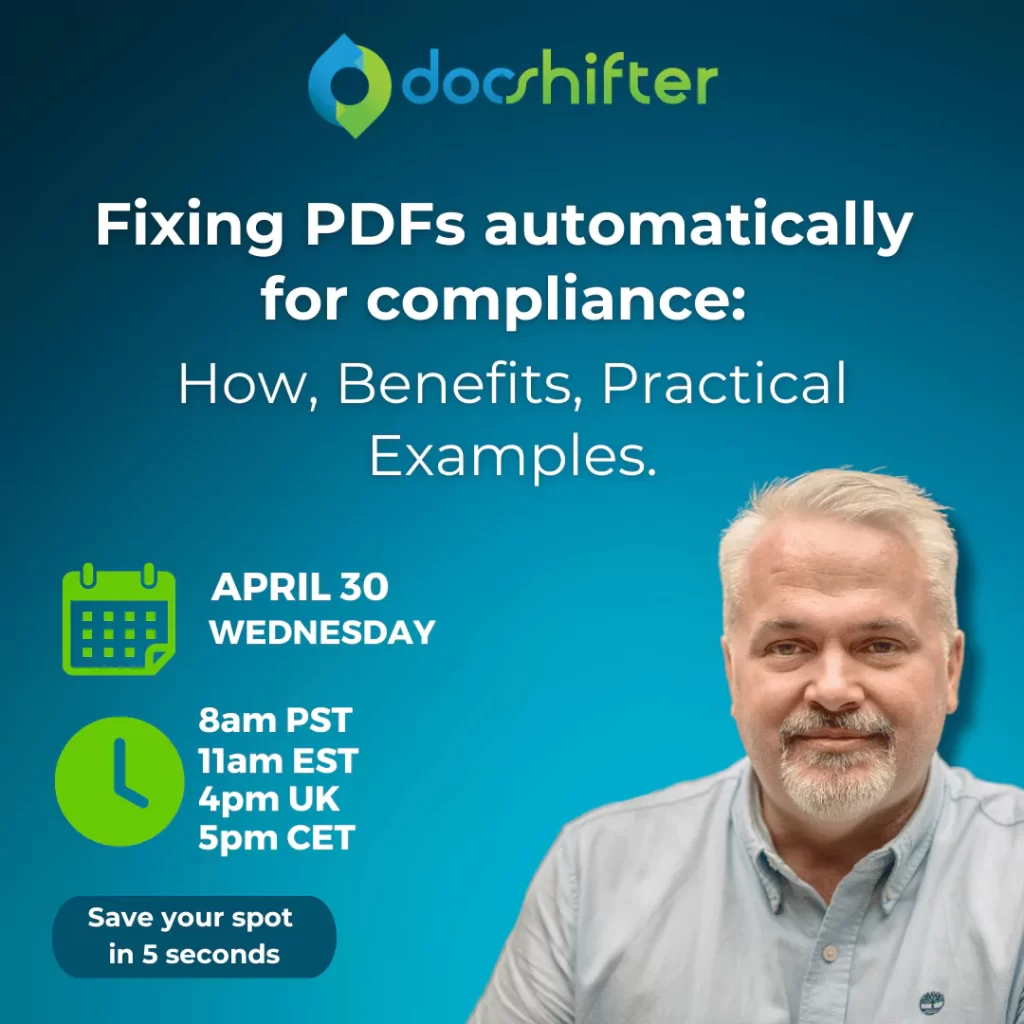
Free checklist for PDF format specifications for FDA submissions
-
By Othmane Achir
- 4 minutes read
Pharmaceutical and biotechnology companies spend a lot of effort in the R&D process of a new medicine or a product. As every stage must be properly documented, a typical R&D process generates huge quantities of documents. And in a lot of different formats: Word, Excel, PowerPoint, text files, scanned PDFs, image files and many more.
Why is it important to comply with the US FDA PDF submission requirements?
Health authorities base their specific submission content requirements on guidelines. Not complying with these guidelines will increase the risk of refusal to file (RTF) and loss of revenue. In case of technical non-compliance, the documents must be reformatted again, which also increases the amount of manual work.
Even though FDA provides some flexibility in how the final documents for submissions should be like, these guidelines should be followed in most business cases.
What are the FDA submission requirements for PDF files? (What are the FDA PDF specifications?)
To ensure the PDF is compliant, the original source documents must be prepared in a specific way. The PDF file must be:
- Including all content from the original source.
- Readable by Adobe Acrobat X.
- The correct PDF version (1.4 – 1.7 or PDF/A-1, PDF/A-2)
- Free from JavaScript or any other dynamic content
- Free from password or other restrictions.
- Embedding all non-standard fonts.
- Using font sizes from 9 to 12.
- Free from PDF annotations
- Text searchable if they are scanned.
- Optimized for fast web view
- Including table of contents if they are 5 pages or larger.
These are just some of the PDF file format specifications for electronic submissions to the FDA. You can find all the FDA PDF formatting specifications in our free checklist. Please click here to download the FDA PDF formatting specifications checklist.
What is the easiest way to comply with the PDF requirements for US FDA eCTD submissions?
The stringent PDF requirements make US FDA eCTD submissions very complex. Many source documents need to be formatted in a specific way. Hyperlinks, bookmarks, navigation options, table of contents, page margins, PDF versions, annotations, PDF security options, fonts and many more. Manipulating and finalizing all these documents remains a challenging task.
Many pharmaceutical and biotechnology companies either do these in-house, or have outsourced it. Yet, finalizing PDFs for submissions is still done manually, using desktop tools. Think of PDF plug-ins or macros, for example.
To save you time and simplify submission-ready PDF generation from source content, we developed the DocShifter software. DocShifter is able to generate fully compliant (high quality, searchable, navigation-rich), submission-ready PDF renditions from your source content. Simultaneously, for FDA, EMA, PMDA or any other health authorities. Reducing risk of non-compliance and speeding up time to market.
Connect DocShifter with your submission management system(s), and convert original source documents into fully Health Authority compliant PDF renditions. No manual intervention or desktop tools required. Maintain essential quality and compliance, and speed up time to market.
Please have a look in the video to see how you can simplify FDA submission content preparation with DocShifter.
Would you like to schedule a demo with your own (anonymized) content? Happy to arrange that as well. Please pick a day & hour that works for you.
Did you enjoy this blog post? We have more free knowledge-articles available for you.
Thank you very much for reading our blog post, we hope you enjoyed it.
For more free articles on regulatory topics (eCTD, regulatory submissions, RIM, eCTD v4.0, etc.) we invite you to join our free LinkedIn Regulatory Community.
This community is where we share tips & tricks, updates, and learnings on regulatory topics. The community currently has 2500 members and is growing quickly.
-
The PDF format specifications checklist for FDA submissions.
- eCTD 4.0: Key Changes & Impact on Submission Content Preparation
If you think this is interesting, I would like to personally invite you to join the Regulatory Professionals Community on LinkedIn. And don’t worry, it is completely free.


